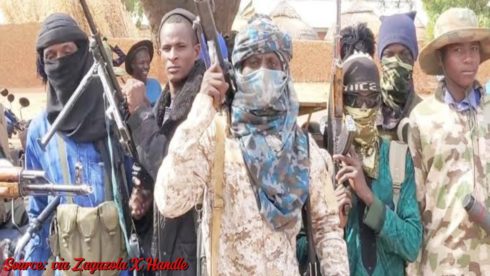Bello Turji, a notorious bandit leader, has been forced into a life of constant movement due to intensified military operations targeting his hideouts. Security forces have heightened their efforts to dismantle his network and neutralize his influence in northern Nigeria, leaving him with no option but to flee from one forest to another. Bello Turji, once considered untouchable, now finds himself in a precarious situation, unable to settle in one place.
Reports indicate that Bello Turji has been fleeing between various forest regions, from Shinkafi to Tsafe, Isa, and Sabon Birni. This constant movement has not only weakened his operations but has also made him more vulnerable to capture as military forces close in on his known locations. The relentless pursuit by security agencies underscores the government’s commitment to eradicating banditry and restoring peace to affected areas.
Shinkafi Forest No Longer a Safe Haven for Bello Turji
Once considered one of his strongholds, the Shinkafi forest is no longer a safe base for Bello Bello Turji. The Nigerian military has launched multiple air and ground assaults on the forest, destroying camps and forcing bandits to scatter. Bello Turji, who once had free reign over the area, has been uprooted by these intense military actions. His fighters have been severely weakened, and his supply routes have been disrupted.
Shinkafi, located in Zamfara State, has long been a hotspot for banditry. However, recent military gains have shifted the balance of power in favor of security forces, making it increasingly difficult for bandit leaders like Bello Turji to operate. The military’s tactical approach in the region has limited Bello Turji’s ability to regroup, forcing him to seek refuge in neighboring forests.
Bello Turji Moves to Tsafe, Isa, and Sabon Birni Forests
Following the military crackdown in Shinkafi, Bello Turji was forced to relocate to Tsafe, Isa, and Sabon Birni forests, in a desperate attempt to evade capture. These regions, situated across Zamfara, Sokoto, and Katsina States, have become the new battlegrounds as military forces extend their operations. Bello Turji’s movements have been closely monitored, with intelligence reports suggesting that his network is struggling to maintain cohesion.
While the dense forests offer cover, the military’s increased use of surveillance technology and drone strikes has made it harder for Bello Turji to remain undetected. His transition from one forest to another has disrupted his ability to launch coordinated attacks and manage his criminal enterprises. The pressure is mounting as security agencies close in on his hiding spots.
Military Strategy: Isolating Turji’s Network
The military’s strategy against Bello Turji involves isolating him from his network of fighters and collaborators. By targeting his known hideouts and cutting off supply lines, security forces aim to weaken his operational capabilities. Recent raids have led to the capture of several of his key lieutenants, further diminishing his influence in the region.
In addition to ground offensives, the military has also intensified air raids, specifically targeting Bello Turji’s camps and supply convoys. This combination of air and land operations has left Bello Turji with fewer resources and limited mobility, reducing his ability to conduct raids or regroup his forces. The military’s aggressive approach signals a determined effort to finally bring an end to his reign of terror.
Civilian Impact: Hope and Uncertainty in Affected Regions
For residents of Zamfara, Sokoto, and Katsina, the military’s pursuit of Bello Turji has brought both hope and uncertainty. On one hand, the intensified operations have disrupted bandit activities, offering a sense of relief to communities long terrorized by kidnappings and violent raids. However, as Turji remains on the run, there is concern that desperate bandits may lash out at civilians, leading to renewed violence.
Local leaders have expressed support for the military’s efforts but also called for increased protection of vulnerable communities. Many are hopeful that the capture or elimination of Bello Turji will mark the beginning of lasting peace, but fear lingers as long as the bandit leader remains at large. The government has urged residents to cooperate with security forces by providing information that could aid in his capture.
The Future of Banditry in Northern Nigeria
The military’s relentless operations against Bello Turji raise questions about the future of banditry in northern Nigeria. Turji’s downfall could signal a turning point in the government’s fight against organized crime, but experts warn that the underlying socio-economic issues fueling banditry, such as poverty and lack of education, must also be addressed to achieve lasting peace.
While the ongoing operations have significantly weakened Turji’s forces, it is unclear how long he can evade capture. His continuous flight from one forest to another shows that the government’s strategy is effective in disrupting bandit activities, but a comprehensive solution will require more than military action. For now, all eyes remain on the pursuit of Bello Turji, as the nation waits to see if his capture will mark a significant victory against banditry.
Table of Contents
Discover more from OGM News NG
Subscribe to get the latest posts sent to your email.













